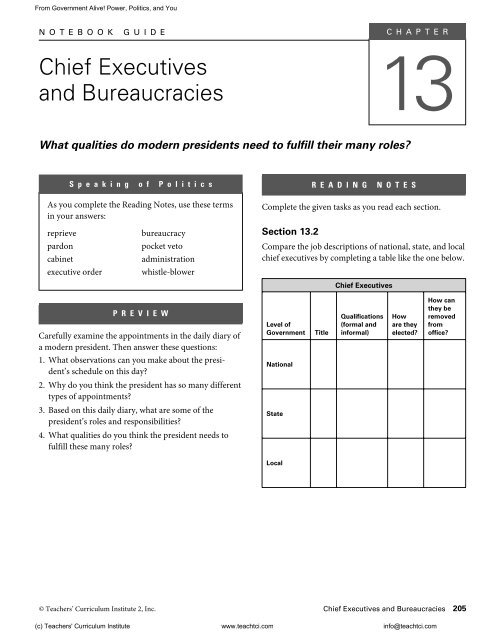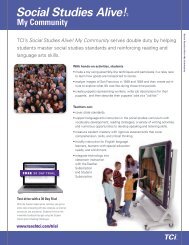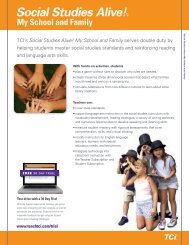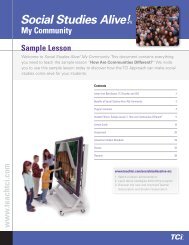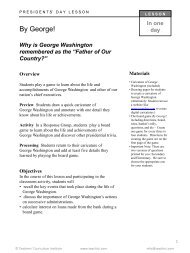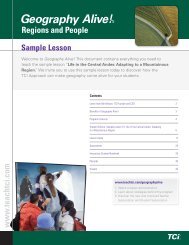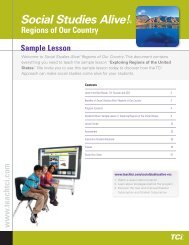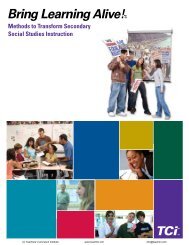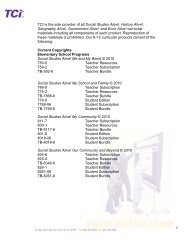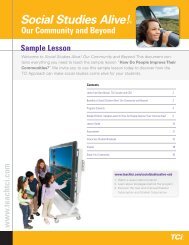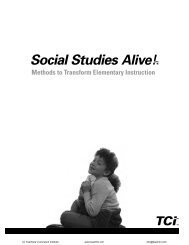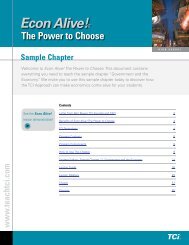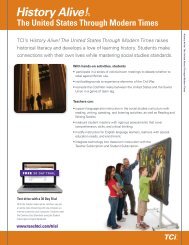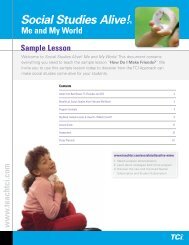Chief Executives and Bureaucracies - TCI
Chief Executives and Bureaucracies - TCI
Chief Executives and Bureaucracies - TCI
Create successful ePaper yourself
Turn your PDF publications into a flip-book with our unique Google optimized e-Paper software.
From Government Alive! Power, Politics, <strong>and</strong> YouNOTEBOOK GUIDE<strong>Chief</strong> <strong>Executives</strong><strong>and</strong> <strong>Bureaucracies</strong>CHAPTER13What qualities do modern presidents need to fulfill their many roles?S p e a k i n g o f P o l i t i c sAs you complete the Reading Notes, use these termsin your answers:reprievepardoncabinetexecutive orderbureaucracypocket vetoadministrationwhistle-blowerR E A D I N G N O T E SComplete the given tasks as you read each section.Section 13.2Compare the job descriptions of national, state, <strong>and</strong> localchief executives by completing a table like the one below.<strong>Chief</strong> <strong>Executives</strong>P R E V I E WCarefully examine the appointments in the daily diary ofa modern president. Then answer these questions:1. What observations can you make about the president’sschedule on this day?2. Why do you think the president has so many differenttypes of appointments?3. Based on this daily diary, what are some of thepresident’s roles <strong>and</strong> responsibilities?4. What qualities do you think the president needs tofulfill these many roles?Level ofGovernmentNationalStateTitleQualifications(formal <strong>and</strong>informal)Howare theyelected?How canthey beremovedfromoffice?Local© Teachers’ Curriculum Institute 2, Inc. <strong>Chief</strong> <strong>Executives</strong> <strong>and</strong> <strong>Bureaucracies</strong> 205(c) Teachers' Curriculum Institute www.teachtci.com info@teachtci.com
From Government Alive! Power, Politics, <strong>and</strong> YouNotebook Guide 13Section 13.31. Briefly explain how one of the presidents describedin this section defined or exercised the powers ofthe presidency.2. In what ways do you think presidents today are morepowerful today than they were in the past?Section 13.41. Describe the roles of the modern president by completinga spoke diagram like the one below. For eachrole, identify at least three powers or responsibilities<strong>and</strong> create a simple symbol.Section 13.6Create an analogy that evaluates the role <strong>and</strong> impact ofgovernment bureaucracies on the lives of Americans bycompleting this statement: Government bureaucraciesare like . . .Use one of these options to complete your analogy,or create your own:• an overbearing parent who controls your life• an overloaded computer hard drive that keepscrashing• a well-oiled engine that keeps a car running• an emergency room doctor who saves livesIllustrate your analogy with a simple drawing. Thenwrite at least two statements beginning with the wordbecause to explain your analogy.2. What checks does the president have on the legislative<strong>and</strong> judicial branches?Section 13.5Fill in a table like the one below by summarizing themain function of each group in the executive branch.Include at least two examples of individuals, departments,or agencies within each group.WhiteHouseStaffExecutiveOffice of thePresidentRoles ofthe ModernPresidentThe PresidentExecutiveDepartmentsIndependentAgenciesP R O C E S S I N GCreate <strong>and</strong> conduct an opinion survey to evaluate thecurrent president’s job performance.• Your survey will have nine questions. The first eightquestions will focus on the eight presidential roles.For each of these questions, provide a brief descriptionof that role <strong>and</strong> then ask, Do you approve ordisapprove of the way the president is performingin this role? Add a final question that assesses thepresident’s overall job performance.• Conduct the survey by polling at least 10 individualsoutside your class.• Compile your survey results for each of the ninequestions. Then write a paragraph summarizingyour results.206 Chapter 13 © Teachers’ Curriculum Institute 2, Inc.(c) Teachers' Curriculum Institute www.teachtci.com info@teachtci.com
From Government Alive! Power, Politics, <strong>and</strong> YouInformation Master 13Appointments in a Modern President’s Daily DiaryLocationTHE WHITE HOUSEWASHINGTON, D.CDate APRIL 24Day THURSDAYTIMEACTIVITY5:30 a.m. The President received a wake-up call.8:32 a.m. The President participated in a meeting to discuss FederalTrade Commission legislation with selected Members ofCongress.9:30 a.m. The President met with Shimon Perez, Chairman of the LaborParty of the State of Israel.11:02 a.m. The President met to discuss the economy <strong>and</strong> inflation withrepresentatives of the metals <strong>and</strong> metal product industries.11:55 a.m. The President met with Hamilton Jordan, <strong>Chief</strong> of Staff.1:20 p.m. The President participated in a meeting to discuss theAdministration’s anti-inflation program <strong>and</strong> fair housinginitiatives with Hispanic leaders.2:03 p.m. The President participated in a ceremony to receivediplomatic credentials from the ambassadors of St. Lucia,the Bahamas, Haiti, Lesotho, El Salvador, <strong>and</strong> Japan.3:37 p.m. The President talked with the Chairman of the Joint <strong>Chief</strong>sof Staff, General David C. Jones.4:19 p.m. The President met to discuss the upcoming Presidentialcampaign.5:27 p.m. The President talked with the First Lady in Detroit,Michigan.8:06 p.m. The President met with the Vice President, Secretaryof State, Secretary of Defense, <strong>and</strong> other White Houseadvisers.12:15 a.m. The President retired.© Teachers’ Curriculum Institute 2, Inc. <strong>Chief</strong> <strong>Executives</strong> <strong>and</strong> <strong>Bureaucracies</strong> 207(c) Teachers' Curriculum Institute www.teachtci.com info@teachtci.com
From Government Alive! Power, Politics, <strong>and</strong> YouStudent H<strong>and</strong>out 13APresident Franklin RooseveltA Day in the Life of President Franklin RooseveltPresident Franklin D. Roosevelt took office in 1933 during the nation’s worst economiccrisis, the Great Depression. In 1933, some 13 million Americans—nearly one-fourth ofthe workforce—were unemployed. This unemployment had a cascading effect. The unemployedhad little to spend, so many business lost customers <strong>and</strong> had to close—increasingunemployment. In addition to losing their jobs, many people lost their savings <strong>and</strong>homes. Soup kitchens <strong>and</strong> breadlines became a common sight in most cities. Promising aNew Deal that would help the needy <strong>and</strong> promote recovery, Roosevelt entered the WhiteHouse in a l<strong>and</strong>slide victory.On March 5, 1933, President Roosevelt got to work solving the nation’s economic crisis.He focused his first day in office on dealing with problems in the financial sector. Loss ofpublic confidence in the ability of the banking industry to safeguard people’s money hadcaused periodic bank runs. Panicked depositors lined up in front of banks to try to withdrawtheir money. Those first in line got their money out. But once a bank ran out of cash,it closed its doors. By 1933, one-fifth of the banks that had been in business in the UnitedStates in 1930 had failed, <strong>and</strong> 9 million people had seen their savings vanish.Roosevelt spent most of his first day in meetings with his cabinet <strong>and</strong> selected membersof Congress. He “concluded that forty-eight different methods of h<strong>and</strong>ling the bankingsituation [were] impossible.” After checking with his attorney general about his power toact in this situation, the president decided to proclaim a national banking holiday. Thisholiday would close all banks temporarily, stopping the steady withdrawal of funds. Healso called Congress into a special session to pass the Emergency Banking Act. This law,passed on March 9, reformed the banking system <strong>and</strong> gave the federal government morepower to supervise banks.Roosevelt would explain all of his actions to the American people in his first fireside chaton the night of March 12. He hoped to restore their confidence in the banking system, <strong>and</strong>he urged Americans to do their part as well.208 Chapter 13 © Teachers’ Curriculum Institute 2, Inc.(c) Teachers' Curriculum Institute www.teachtci.com info@teachtci.com
From Government Alive! Power, Politics, <strong>and</strong> YouStudent H<strong>and</strong>out 13AAppointments in President Roosevelt’s Daily DiaryLocationTHE WHITE HOUSEWASHINGTON, D.CDate MARCH 5, 1933Day SUNDAYTIMEACTIVITY9:00 a.m. The President <strong>and</strong> his family attended services atSt. Thomas’ Church.11:00 a.m. The President attended a luncheon at the White Housewith his family <strong>and</strong> friends.2:30 p.m. The President met in the Oval Office with members of theCabinet, the Vice President, <strong>and</strong> the Speaker of the Houseto discuss the banking situation.3:30 p.m. The President met with Congressional leaders to discusscalling Congress into special session so he couldintroduce legislation to address the banking situation.4:45 p.m. The President issued a proclamation calling Congress intospecial session.6:00 p.m. The President, Attorney General, Secretary of theTreasury, <strong>and</strong> other advisers worked on a proclamationto declare a national banking holiday.7:30 p.m. The President had supper with his sons.9:45 p.m. The President spoke with representatives of the four PressAssociations to explain the banking holiday.11:30 p.m. The President gave a five minute radio address to theAmerican Legion [an organization for American veterans].11:36 p.m. The President met with the Secretary of State aboutforeign policy issues, including the success of theNazi Party in the German elections.Source: Franklin D. Roosevelt Presidential Library <strong>and</strong> Museum.© Teachers’ Curriculum Institute 2, Inc. <strong>Chief</strong> <strong>Executives</strong> <strong>and</strong> <strong>Bureaucracies</strong> 209(c) Teachers' Curriculum Institute www.teachtci.com info@teachtci.com
From Government Alive! Power, Politics, <strong>and</strong> YouStudent H<strong>and</strong>out 13APresident Roosevelt Document 1Proclamation No. 2038Calling Congress into Extraordinary SessionMarch 5, 1933Whereas public interests require that the Congress ofthe United States should be convened in extra session attwelve o’clock, noon, on the Ninth day of March, 1933, toreceive such communication as may be made by the Executive;Now, Therefore, I, Franklin D. Roosevelt, Presidentof the United States of America, do hereby proclaim<strong>and</strong> declare that an extraordinary occasion requires theCongress of the United States to convene in extra sessionat the Capitol in the City of Washington on the Ninthday of March, 1933, at twelve o’clock, noon, of whichall persons who shall at that time be entitled to actas members thereof are hereby required to take notice.IN WITNESS WHEREOF, I have hereunto set my h<strong>and</strong> <strong>and</strong>caused to be affixed the great seal of the United States.Source: The American Presidency Project.210 Chapter 13 © Teachers’ Curriculum Institute 2, Inc.(c) Teachers' Curriculum Institute www.teachtci.com info@teachtci.com
From Government Alive! Power, Politics, <strong>and</strong> YouStudent H<strong>and</strong>out 13APresident Roosevelt Document 2First Fireside Chat, March 12, 1933I want to talk for a few minutes with the people of theUnited States about banking . . . I want to tell you whathas been done in the last few days, why it was done, <strong>and</strong>what the next steps are going to be . . .What, then, happened during the last few days of February<strong>and</strong> the first few days of March? Because of underminedconfidence on the part of the public, there was ageneral rush by a large portion of our population to turnbank deposits into currency or gold—a rush so great thatthe soundest banks could not get enough currency to meetthe dem<strong>and</strong> . . . By the afternoon of March 3d scarcely abank in the country was open to do business . . .It was then that I issued the proclamation providingfor the nationwide bank holiday, <strong>and</strong> this was the firststep in the Government’s reconstruction of our financial<strong>and</strong> economic fabric.The second step was the legislation promptly <strong>and</strong>patriotically passed by the Congress confirming myproclamation <strong>and</strong> broadening my powers so that itbecame possible . . . to extend the holiday <strong>and</strong> lift theban of that holiday gradually . . .This bank holiday, while resulting in many cases ingreat inconveniences, is affording us the opportunity tosupply the currency necessary to meet the situation . . .We had a bad banking situation. Some of our bankershad shown themselves either incompetent or dishonestin their h<strong>and</strong>ling of the people’s funds. They had usedthe money entrusted to them in speculations <strong>and</strong> unwiseloans. This was, of course, not true in the vast majority ofour banks, but it was true in enough of them to shock thepeople for a time into a sense of insecurity . . . It was theGovernment’s job to straighten out this situation <strong>and</strong> do itas quickly as possible. And the job is being performed.I do not promise you that every bank will be reopenedor that individual losses will not be suffered . . . We [thegovernment] shall be engaged not merely in reopeningsound banks but in the creation of sound banks throughreorganization.It has been wonderful to me to catch the note ofconfidence from all over the country. I can never besufficiently grateful to the people for the loyal supportthey have given me . . .After all, there is an element in the readjustment of ourfinancial system more important than currency, moreimportant than gold, <strong>and</strong> that is the confidence of thepeople. Confidence <strong>and</strong> courage are the essentials of successin carrying out our plan. You people must have faith;you must not be stampeded by rumors or guesses. Let usunite in banishing fear. We have provided the machineryto restore our financial system; it is up to you to support<strong>and</strong> make it work.It is your problem no less than it is mine. Together wecannot fail.Source: The American Presidency Project.© Teachers’ Curriculum Institute 2, Inc. <strong>Chief</strong> <strong>Executives</strong> <strong>and</strong> <strong>Bureaucracies</strong> 211(c) Teachers' Curriculum Institute www.teachtci.com info@teachtci.com
From Government Alive! Power, Politics, <strong>and</strong> YouStudent H<strong>and</strong>out 13ATranscript of President Roosevelt Audio ClipInaugural Address, March 4, 1933President Hoover, Mr. <strong>Chief</strong> Justice, my friends: This isa day of national consecration, <strong>and</strong> I am certain that onthis day my fellow Americans expect that on my inductioninto the Presidency I will address them with a c<strong>and</strong>or <strong>and</strong>a decision which the present situation of our people impels.This is preeminently the time to speak the truth, thewhole truth, frankly <strong>and</strong> boldly. Nor need we shrink fromhonestly facing conditions in our country today. Thisgreat Nation will endure as it has endured, will revive, <strong>and</strong>will prosper. So, first of all, let me assert my firm beliefthat the only thing we have to fear is . . . fear itself . . .Our greatest primary task is to put people to work. [applause]This is no unsolvable problem if we face it wisely<strong>and</strong> courageously. It can be accomplished in part by directrecruiting by the Government itself, treating the task as wewould treat the emergency of a war, but at the same time,through this employment, accomplishing great greatlyneeded projects to stimulate <strong>and</strong> reorganize the use of ourgreat natural resources.H<strong>and</strong> in h<strong>and</strong> with that, we must frankly recognizethe overbalance of population in our industrial centers<strong>and</strong>, by engaging on a national scale in a redistribution,endeavor to provide a better use of the l<strong>and</strong> for those bestfitted for the l<strong>and</strong>.I am prepared, under my constitutional duty, to recommendthe measures that a stricken nation in the midst of astricken world may require. These measures, or such othermeasures as the Congress may build out of its experience<strong>and</strong> wisdom, I shall seek, within my constitutional authority,to bring to speedy adoption.But, in the event that the Congress shall fail to take oneof these two courses, in the event that the national emergencyis still critical, I shall not evade the clear course ofduty that will then confront me. I shall ask the Congressfor the one remaining instrument to meet the crisis—broad Executive power to wage a war against the emergency,as great as the power that would be given to me ifwe were in fact invaded by a foreign foe. [applause]For the trust reposed in me, I will return the courage<strong>and</strong> the devotion that befit the time. I can do no less.Source: The American Presidency Project.212 Chapter 13 © Teachers’ Curriculum Institute 2, Inc.(c) Teachers' Curriculum Institute www.teachtci.com info@teachtci.com
From Government Alive! Power, Politics, <strong>and</strong> YouStudent H<strong>and</strong>out 13BPresident Lyndon JohnsonA Day in the Life of President Lyndon JohnsonPresident Lyndon B. Johnson took office in 1963 after the assassination of President JohnF. Kennedy. The former vice president promised to carry on Kennedy’s idealistic visionfor the American people. He spoke of moving toward a Great Society, where there wasabundance <strong>and</strong> liberty for all <strong>and</strong> an end to poverty <strong>and</strong> racial injustice. Johnson promotedthis Great Society by declaring the War on Poverty. He introduced a number of legislativeinitiatives aimed at improving the economic welfare of Americans. He also voicedstrong support for the civil rights movement <strong>and</strong> signed the Civil Rights Act of 1964.On August 4, 1964, President Johnson continued his commitment to the Great Societyby meeting with various members of Congress to discuss his legislative proposals. At11:06 A.M., he received a telephone call that prompted a dramatic shift in his priorities. Inthe middle of a meeting with Congressman George Mahon, Johnson was interrupted byan urgent call from Secretary of Defense Robert McNamara. According to McNamara,U.S. ships in the Gulf of Tonkin off the coast of North Vietnam were under attack. Thiswas especially unsettling news, as an attack had occurred only two days prior. It seemedthat the North Vietnamese had ignored Johnson’s warning that an unprovoked attackon U.S. ships would have serious consequences. Johnson <strong>and</strong> his advisers set to work ina series of meetings that would last most of the afternoon <strong>and</strong> into the evening.Johnson had a difficult decision to make on this day. For the United States, it seemed thatthe situation in Vietnam had reached a crisis point. Johnson had inherited the growingproblem in Vietnam from Kennedy. Though the United States wanted to contain communismin Southeast Asia, Kennedy did not want to send U.S. troops overseas to help theSouth Vietnamese fight an insurgency supported by communist North Vietnam. Kennedyhad sent weapons, equipment, technicians, <strong>and</strong> advisers, but the South Vietnamesewere still losing. Johnson had increased U.S. support by authorizing covert attacks onradar stations along North Vietnam’s coast. U.S. Navy warships located the stations, butthe South Vietnamese carried out the attacks. Johnson had hoped to disrupt the flow ofmilitary aid into South Vietnam from North Vietnam. On August 2, the North Vietnamesehad fired machine guns <strong>and</strong> torpedoes at a U.S. destroyer in the Gulf of Tonkin. Now,just two days later, reports indicated that a second attack had occurred.Johnson decided to retaliate by ordering air strikes against naval bases in North Vietnam.He asked Congress to grant him authorization for these air strikes as well as the powerto deal with any future attacks. At 11:34 P.M.—only 12 hours after first hearing about theattack—Johnson addressed the nation with news of the Gulf of Tonkin attack. It was laterdiscovered that a second attack had never actually taken place.© Teachers’ Curriculum Institute 2, Inc. <strong>Chief</strong> <strong>Executives</strong> <strong>and</strong> <strong>Bureaucracies</strong> 213(c) Teachers' Curriculum Institute www.teachtci.com info@teachtci.com
From Government Alive! Power, Politics, <strong>and</strong> YouStudent H<strong>and</strong>out 13BAppointments in President Johnson’s Daily DiaryLocationTHE WHITE HOUSEWASHINGTON, D.CDate AUGUST 4, 1964Day SUNDAYTIMEACTIVITY10:34 a.m. The President met with S. K. Patil, the Indian RailwayMinister, <strong>and</strong> his translator.10:40 a.m. The President met with Congressman George Mahon to discussthe status of his proposed legislation.11:06 a.m. The President took a call from Secretary of Defense RobertMcNamara. The Secretary reported that U.S. ships in theGulf of Tonkin had been attacked by the North Vietnamese.12:35 p.m. The President went to the Cabinet Room for a NationalSecurity Council meeting to discuss the situation inNorth Vietnam.2:35 p.m. The President joined Mrs. Johnson’s tea group. He stayedfor eight minutes <strong>and</strong> shook h<strong>and</strong>s with the group.2:43 p.m. The President sent flowers with a card to Senator DanielBrewster in Bethesda Naval Hospital <strong>and</strong> to Senator VanceHartke’s daughter at George Washington University Hospital.3:17 p.m. The President sent two judicial nominations to the Senate.6:16 p.m. The President went to the Cabinet Room for a NationalSecurity Council meeting to discuss the situation inNorth Vietnam.8:01 p.m. The President took a call from FBI Assistant DirectorCartha D. DeLoach. DeLoach delivered news of the findingof the bodies of three Mississippi civil rights workers.11:34 p.m. The President appeared before live television cameras tomake a media statement about the action in Vietnam.11:59 p.m. The President spoke with Ambassador Averell Harriman aboutthe President’s upcoming visit to Syracuse to help thecampaigns of Democratic c<strong>and</strong>idates.Source: Lyndon Baines Johnson Library.214 Chapter 13 © Teachers’ Curriculum Institute 2, Inc.(c) Teachers' Curriculum Institute www.teachtci.com info@teachtci.com
From Government Alive! Power, Politics, <strong>and</strong> YouStudent H<strong>and</strong>out 13BPresident Johnson Document 1Status of BillsAugust 4, 1964Poverty bill - Passed Senate -- On House floor for Wednesday. Open rule,6 hours debateWilderness bill - Expected to go to conference shortlyFood Stamp bill - In Rules Committee for House to recede <strong>and</strong> concur onSenate amendments - possibility of Rules Committee actionon ThursdayHousing bill - Passed Senate - House Committee to consider tomorrow --possibility of floor action sometime next weekNurses training bill - Passed House - Senate Labor Subcommittee willschedule as soon as Senator Hill completes HEW appropriationImmigration legislation - Still in CommitteeFood for Peace - House Subcommittee has marked-up bill - Full Committeemay consider on Friday - to Rules early next week -- SenatorEllender hopes to consider week of August 10Foreign aid bill - Passed House -- On Senate floor for debateInternational Coffee Agreement - Passed both Houses - Question, toconcur in Dirksen amendment or conferenceWater pollution control bill - Passed Senate - House Committee expectedto report Senate passed bill this weekL<strong>and</strong> conservation fund - Passed House - Senate Committee expected toreport out todaySocial Security amendments of ’64 - Passed House - Senate Committee tomeet today to discuss hearings procedureSource: Lyndon Baines Johnson Library.© Teachers’ Curriculum Institute 2, Inc. <strong>Chief</strong> <strong>Executives</strong> <strong>and</strong> <strong>Bureaucracies</strong> 215(c) Teachers' Curriculum Institute www.teachtci.com info@teachtci.com
From Government Alive! Power, Politics, <strong>and</strong> YouStudent H<strong>and</strong>out 13BPresident Johnson Document 2Summary Notes of the 538th National Security MeetingTOP SECRET/SENSITIVEAugust 4, 1964FOR THE PRESIDENT ONLY6:15 to 6:40 p.m.Secretary of Defense McNamara: The North Vietnamese PT boats have continuedtheir attacks on the two U.S. destroyers in international waters in the Gulfof Tonkin. No enemy aircraft was involved...Secretary of State Rusk: An immediate <strong>and</strong> direct reaction by us is necessary.The unprovoked attack on the high seas is an act of war for all practicalpurposes ... We are informing NATO, SEATO, <strong>and</strong> the UN ... This second attackwas a more serious decision for the North Vietnamese than... the first attack.McNamara: We have agreed to air strikes on two bases in the north of NorthVietnam <strong>and</strong> two base complexes in the south of North Vietnam ...CIA Director McCone: The proposed U.S. reprisals will result in a sharp NorthVietnamese military reaction, but such actions would not represent a deliberatedecision to provoke or accept a major escalation of the Vietnamese war ...President: Do they want a war by attacking our ships in ... the Gulf of Tonkin?McCone: No. The North Vietnamese are reacting defensively to our attackson their off-shore isl<strong>and</strong>s. They are responding out of pride <strong>and</strong> on thebasis of defense considerations. The attack is a signal to us that theNorth Vietnamese have the will <strong>and</strong> determination to continue the war ...President: Are we going to react to their shooting at our ships over 40miles from their shores? If yes, we should do more than merely return thefire of the attacking ships ...USIA Director Rowan: Do we know for a fact that the North Vietnameseprovocation took place? Can we nail down exactly what happened? We mustbe prepared to be accused of fabricating the incident.McNamara: We will know definitely in the morning. As of now, only highlyclassified information nails down the incident. This information we cannotuse <strong>and</strong> must rely on other reports we will be receiving.Rusk: We should ask the Congressional leaders whether we should seek aCongressional resolution ...McNamara: In addition to the air strikes, we plan to send major U.S.reinforcements into the area. These include ships, men <strong>and</strong> planes ...A draft statement for the President was revised. It is to be made publicby the President as soon as the U.S. attack planes are over target.Source: Lyndon Baines Johnson Library.216 Chapter 13 © Teachers’ Curriculum Institute 2, Inc.(c) Teachers' Curriculum Institute www.teachtci.com info@teachtci.com
From Government Alive! Power, Politics, <strong>and</strong> YouStudent H<strong>and</strong>out 13CAppointments in President Nixon’s Daily DiaryLocationPUGH RESIDENCEAGANA, GUAMDate FEBRUARY 21, 1972Day MONDAYTIMEACTIVITY6:45 a.m. The President <strong>and</strong> the First Lady motored from the Pugh(Guam time) residence to Guam International Airport.7:11 a.m. The President <strong>and</strong> the First Lady flew to Hung Chiao Airport,Shanghai, People’s Republic of China (PRC). The Presidentmet with his assistants, H. R. Haldeman <strong>and</strong> Henry Kissinger.9:00 a.m. The President <strong>and</strong> First Lady deplaned. They were accompanied(China time) by the Secretary of State, Mr. Haldeman, Mr. Kissinger, <strong>and</strong>the Press Secretary. The Presidential party was greeted byan official delegation of the PRC. The party had tea <strong>and</strong>toured the airport terminal with the Chinese delegation.9:51 a.m. The Presidential party flew to Capital Airport, Peking, PRC.11:30 a.m. The Presidential party was greeted by Chou En-lai, Premierof the State Council of the PRC <strong>and</strong> other PRC officials.The party participated in an arrival ceremony.11:44 a.m. The President, the First Lady <strong>and</strong> Premier Chou motored fromCapital Airport to the Peking guest house. They had teawith U.S. <strong>and</strong> Chinese officials.2:42 p.m. The President <strong>and</strong> Premier Chou motored to the residence ofMao Tse-tung, Chairman of the Politburo of the PRC. ThePresident met with Chairman Mao.5:42 p.m. The President motored to the Great Hall of the People.The President <strong>and</strong> Premier Chou met with U.S. <strong>and</strong> Chineseofficials. Members of the press were in attendance.7:42 p.m. The Presidential party attended a welcoming banquet hostedby Premier Chou.10:27 p.m. The President signed Senate Joint Resolution 197, an arbitrationsettlement procedure for the West Coast dock strike.Source: Nixon Presidential Library <strong>and</strong> Museum.© Teachers’ Curriculum Institute 2, Inc. <strong>Chief</strong> <strong>Executives</strong> <strong>and</strong> <strong>Bureaucracies</strong> 219(c) Teachers' Curriculum Institute www.teachtci.com info@teachtci.com
From Government Alive! Power, Politics, <strong>and</strong> YouStudent H<strong>and</strong>out 13CTranscript of President Nixon Audio ClipOval Office MeetingJanuary 26, 1972In attendance are Richard Nixon, Barend Biesheuvel, Alex<strong>and</strong>er Haig, <strong>and</strong> J. William Middendorf.Nixon: Uh, we do believe that by starting the long process of some sort of contact, there will—Iwill say, obviously, it will not come to recognition on our part—Biesheuvel: No.Nixon: —because it cannot, since we still recognize Taiwan <strong>and</strong> will continue to honor ourtreaty commitments. They know this will not come out. What may come out of it will be, uh,however, uh, uh, some method of communication in the future, uh, some contact in the future,uh, <strong>and</strong> perhaps reducing the chance in the immediate future of a confrontation between theUnited States <strong>and</strong> the PRC in Asia, such as we had in Korea, <strong>and</strong> such as we had indirectly inVietnam. And looking further in the future, uh, when they become a super power, a nuclearsuper power, uh, to be in a position that at that time, uh, we will have such relations with themthat, uh, we, uh, can discuss differences <strong>and</strong>, <strong>and</strong> not inevitably have a clash. Now, also, no onecan look at Asia, uh, <strong>and</strong> take 750 million Chinese out of it <strong>and</strong> say you can have any policy inthe Pacific that will succeed in preventing war without having the Chinese a part of it. It’s just ascold-blooded as that.Source: Nixon Presidential Library <strong>and</strong> Museum.222 Chapter 13 © Teachers’ Curriculum Institute 2, Inc.(c) Teachers' Curriculum Institute www.teachtci.com info@teachtci.com
From Government Alive! Power, Politics, <strong>and</strong> YouStudent H<strong>and</strong>out 13DAppointments in President Bush’s Daily DiaryLocationTHE WHITE HOUSEWASHINGTON, D.C.Date NOVEMBER 9, 1989Day THURSDAYTIMEACTIVITY6:00 a.m. The President <strong>and</strong> the First Lady had breakfast.8:26 a.m. The President met for a national security briefing.10:01 a.m. The President <strong>and</strong> the First Lady participated in an arrivalceremony in honor of the President of the Republic of thePhilippines Corazon C. Aquino.11:00 a.m. The President met with U.S. <strong>and</strong> Philippine officials.11:39 a.m. The President went to the horseshoe pitching court <strong>and</strong>pitched horseshoes.1:15 p.m. The President participated in a photo opportunity withmembers of the country music group “Alabama.”3:22 p.m. The President participated in a question <strong>and</strong> answer sessionwith members of the press on the opening of the bordersbetween East <strong>and</strong> West Berlin.3:52 p.m. The President participated in a message taping sessionfor the Macy’s Thanksgiving Day Parade, the United NegroCollege Fund, congratulations for Sammy Davis, Jr., <strong>and</strong> thePort of Houston 75th Anniversary.4:17 p.m. The President met with his <strong>Chief</strong> of Staff to issue executivenominations <strong>and</strong> appointments.6:28 p.m. The President was telephoned by his Assistant forLegislative Affairs.7:02 p.m. The President <strong>and</strong> the First Lady hosted a State Dinner inhonor of President Aquino. The evening included a receivingline, an exchange of toasts, dinner, a performance fromopera singer Simon Estes, <strong>and</strong> dancing.11:02 p.m. The President <strong>and</strong> the First Lady returned to the secondfloor Residence.Source: George Bush Presidential Library <strong>and</strong> Museum.224 Chapter 13 © Teachers’ Curriculum Institute 2, Inc.(c) Teachers' Curriculum Institute www.teachtci.com info@teachtci.com
From Government Alive! Power, Politics, <strong>and</strong> YouStudent H<strong>and</strong>out 13DPresident Bush Document 1Nomination of Susan J. Crawford to BeInspector General of the Department of DefenseNovember 9, 1989The President today announced his intention to nominate Susan J.Crawford to be Inspector General of the Department of Defense.She would succeed June Gibbs Brown.Since 1983 Mrs. Crawford has served as the General Counsel of theDepartment of the Army. Prior to this, she served as PrincipalDeputy General Counsel of the Department of the Army at the Pentagon,1981 - 1983; partner with a law firm in Oakl<strong>and</strong>, MD, 1979 - 1981;<strong>and</strong> an associate with the same firm, 1977 - 1979.Mrs. Crawford graduated from Bucknell University (B.S., 1969) <strong>and</strong>received a law degree from the New Engl<strong>and</strong> School of Law in 1977.She was born April 22, 1947, in Pittsburgh, PA. Mrs. Crawford ismarried, has one child, <strong>and</strong> resides in Falls Church, VA.Source: The American Presidency Project.© Teachers’ Curriculum Institute 2, Inc. <strong>Chief</strong> <strong>Executives</strong> <strong>and</strong> <strong>Bureaucracies</strong> 225(c) Teachers' Curriculum Institute www.teachtci.com info@teachtci.com
From Government Alive! Power, Politics, <strong>and</strong> YouStudent H<strong>and</strong>out 13DPresident Bush Document 2THE WHITE HOUSEWASHINGTONMEMORANDUM OF TELEPHONE CONVERSATIONSUBJECT:Telephone Conversation with Helmut Kohl, Chancellor,Federal Republic of GermanyPARTICIPANTS: The PresidentChancellor Helmut KohlNotetaker: Robert M. GatesDATE, TIMEAND PLACE:November 10, 1989, 3:29 - 3:47 PMThe Oval OfficeThe President: I’m very interested in the GDR [East Germany].Chancellor Kohl: I’ve just arrived from Berlin. It is like witnessingan enormous fair. It has the atmosphere of a festival. The frontiersare absolutely open. At certain points they are literally takingdown the wall <strong>and</strong> building new checkpoints. At Checkpoint Charlie,thous<strong>and</strong>s of people are crossing both ways. There are many youngpeople who are coming over for a visit enjoying our open way of life.I expect they will go home tonight. I would cautiously tell you thatit appears that the opening has not led to a dramatic increase in themovement of refugees ... This is a dramatic thing; an historic hour ...The overall spirit was optimistic <strong>and</strong> friendly. When I thanked theAmericans for their role in all of this, there was much applause.Without the US this day would not have been possible ...The President: First, let me say how great is our respect for theway the FRG [West Germany] had h<strong>and</strong>led all of this ... I want to tellthe US press of our talk, that you gave me a thorough briefing, <strong>and</strong>that you did publicly acknowledge the role of the US, <strong>and</strong> that you<strong>and</strong> I agreed to talk later next week.Kohl: Excellent.The President: Take care, good luck. I’m proud of the way you’reh<strong>and</strong>ling an extraordinarily difficult problem.Kohl: Thank you. Give my best to Barbara [First Lady Barbara Bush] ...Source: George Bush Presidential Library <strong>and</strong> Museum.226 Chapter 13 © Teachers’ Curriculum Institute 2, Inc.(c) Teachers' Curriculum Institute www.teachtci.com info@teachtci.com
From Government Alive! Power, Politics, <strong>and</strong> YouStudent H<strong>and</strong>out 13DTranscript of President Bush Audio ClipRemarks to the National Association of RealtorsDallas, TexasNovember 10, 1989Before going into my main remarks, let me just say a wordabout the momentous events in East Germany. I wasmoved, as you all were, by the pictures of Berliners fromEast <strong>and</strong> West st<strong>and</strong>ing atop the, the wall with chisels <strong>and</strong>hammers celebrating the opening of the most vivid symbolof the Iron Curtain. And then today, just on the planecoming down, I read a report where 18 new border crossingswould be made in the wall in the, in the near future.And to be honest with you, I doubted that this wouldhappen in the very first year of this administration.Twenty-eight years after the desperate days of 1961, whentanks faced off at Checkpoint Charlie <strong>and</strong> that terriblebarrier was built, now the East German government hasresponded to the wishes of its people. And while no one. . . [applause] And while no one really accurately predictedthe speed of the changes underway in Eastern Europe—<strong>and</strong> certainly I didn’t—but last May, right here in Texas,over at Texas A&M, I noted hopeful, indeed, remarkablesigns of a Soviet break with the cycles of the past. And Icalled upon the Soviet Union to support self-determinationfor the nations of Eastern <strong>and</strong> Central Europe <strong>and</strong>to tear down the Iron Curtain. And now we’re seeing ithappen. And when I visited Pol<strong>and</strong> <strong>and</strong> Hungary in July,I sensed that historically important events there held theseeds for even more dramatic change.And this played a big part in the decision last Julymade, really, at the G-7 meeting in Paris, <strong>and</strong> on the wayback, I proposed a face-to-face meeting with PresidentGorbachev [of the Soviet Union] before the next spring’ssummit. And the Malta meeting, given recent events, takeson, I think, even more importance than when I conceivedthe idea three <strong>and</strong> a half months ago.The changes in recent months make clear that theprocess of reform initiated by the Eastern Europeans <strong>and</strong>supported by Mr. Gorbachev <strong>and</strong> by America <strong>and</strong> by ourallies is real, offers us all much hope, <strong>and</strong> deserves ourcontinued encouragement. We’re living in fascinatingtimes, <strong>and</strong> we will seize every opportunity to contribute tolasting peace <strong>and</strong> to extend democracy. And in doing so,I will conduct the foreign policy of this great country withthe prudence that these fascinating times, times of change,dem<strong>and</strong>—<strong>and</strong> with the imagination. The 1980s has beenthe decade of American renewal. And I believe thataround the world, the 1990s will inevitably be the decadeof democracy.Source: The American Presidency Project.© Teachers’ Curriculum Institute 2, Inc. <strong>Chief</strong> <strong>Executives</strong> <strong>and</strong> <strong>Bureaucracies</strong> 227(c) Teachers' Curriculum Institute www.teachtci.com info@teachtci.com
From Government Alive! Power, Politics, <strong>and</strong> YouStudent H<strong>and</strong>out 13ECreating an Exhibit for a Presidential Library <strong>and</strong> MuseumYou will work with your group to create an interactive exhibit of the day in thelife of a modern president for one of four presidential libraries <strong>and</strong> museums.Your exhibit should use artifacts—documents, audio clip, photographs, <strong>and</strong>objects—to illustrate the various presidential roles that your president performedon this day. Visitors will tour your exhibit to guess these presidential roles.Step 1: Assign roles for the exhibit.☐ Review the roles below, <strong>and</strong> divide them among the members of your group.Make sure everyone underst<strong>and</strong>s his or her responsibilities. Everyone willparticipate as a museum docent when visitors tour your exhibit.Historical Archivist You will lead the group during Step 2. You will makesure group members learn the key information about your assigned president.You will begin the tour by giving an introductory speech <strong>and</strong> will conclude thetour at the appropriate time.Document Archivist You will lead the group as it analyzes the documentsin Step 3. You will help visitors underst<strong>and</strong> <strong>and</strong> connect these artifacts to thepresident’s daily diary during the tour.Audiovisual Archivist You will lead the group as it analyzes the audio clip<strong>and</strong> photographs in Step 3. You will help visitors underst<strong>and</strong> <strong>and</strong> connectthese artifacts to the president’s daily diary during the tour.Archaeological Archivist You will lead the group as it brainstorms additionalobjects to add to the exhibit in Step 3. You will help visitors underst<strong>and</strong> <strong>and</strong>connect these artifacts to the president’s daily diary during the tour.Step 2: Learn about your assigned president.☐ Take turns reading aloud from the h<strong>and</strong>out about the day in the life of yourpresident. Examine the daily diary of the president on this day. Afterward,have the Historical Archivist lead a discussion of the following questions. Useinfor mation from your Reading Notes <strong>and</strong> the h<strong>and</strong>out in the discussion.• What important crisis or event did the president deal with on this day?• What presidential roles did he perform in dealing with this crisis or event?In what ways did he demonstrate these roles?• What presidential roles did the president perform in dealing with his otherresponsibilities? In what ways did he demonstrate these roles?228 Chapter 13 © Teachers’ Curriculum Institute 2, Inc.(c) Teachers' Curriculum Institute www.teachtci.com info@teachtci.com
From Government Alive! Power, Politics, <strong>and</strong> YouChapter 13 AssessmentMastering the Content1. Who initiated the tradition of addressing the presidentas “Mr. President”?A. Andrew JacksonB. Abraham LincolnC. Theodore RooseveltD. George Washington2. The position of a lieutenant governor in a state iscomparable to that of which position in the federalgovernment?A. attorney generalB. chief of staffC. secretary of defenseD. vice president3. The president’s speechwriters, administrativeassistants, <strong>and</strong> press secretary all work as partof which group?A. White House staffB. White House press corpsC. Executive Office of the PresidentD. Office of Management <strong>and</strong> Budget4. Which of these is not a qualification for seekingthe presidency?A. college graduateB. natural-born citizenC. at least 35 years oldD. lived in United States at least 14 years5. Which factor most influences whether a presidentmight choose to use a pocket veto?A. who in Congress voted for the billB. how close Congress is to adjournmentC. whether the bill has broad public supportD. the impact that signing will have on the budget6. What did Andrew Jackson do that led his critics tocall him “King Andrew”?A. He called Congress into special session.B. He suspended the right of habeas corpus.C. He used the presidency as a “bully pulpit.”D. He exp<strong>and</strong>ed the use of the presidential veto.7. Which of these processes allows voters in manystates to remove an elected official from office?A. impeachmentB. initiativeC. recallD. referendum8. What does the list below show?Vice PresidentSpeaker of the House ofRepresentativesPresident Pro Tempore of the SenateSecretary of StateSecretary of the TreasurySecretary of DefenseAttorney GeneralSecretary of the InteriorSecretary of AgricultureSecretary of Commerce.Secretary of Homel<strong>and</strong> SecurityA. the line of presidential successionB. the makeup of the president’s cabinetC. the organization of the executive branchD. the leadership of the federal bureaucracy9. All of the following are examples of independentagencies except theA. Peace Corps.B. Department of Justice.C. National Endowment for the Arts.D. Environmental Protection Agency.10. What does a whistle-blower do?A. expose wrongdoingB. enforce party loyaltyC. criticize civil servantsD. schedule appointments© Teachers’ Curriculum Institute 2, Inc. Chapter 13 Assessment 231(c) Teachers' Curriculum Institute www.teachtci.com info@teachtci.com
From Government Alive! Power, Politics, <strong>and</strong> YouChapter 13 AssessmentExploring the Essential QuestionWhat qualities do modern presidents need to fulfill their many roles?Article II of the U.S. Constitution defines the formal qualifications <strong>and</strong> powers ofthe president. Read the parts quoted below <strong>and</strong> answer the questions that follow.Article II of the U.S. ConstitutionSection 1. The executive Power shall be vested in a President . . . (Section 1 goes on to describe howpresidents are elected, qualifications, succession, payment, <strong>and</strong> oath of office.)Section 2. The President shall be Comm<strong>and</strong>er in <strong>Chief</strong> of the Army <strong>and</strong> Navy of the United States, <strong>and</strong>of the Militia of the several States, when called into the actual Service of the United States; he may requirethe Opinion, in writing, of the principal Officer in each of the executive Departments, upon any Subjectrelating to the Duties of their respective Offices, <strong>and</strong> he shall have Power to grant Reprieves <strong>and</strong> Pardonsfor Offenses against the United States, except in Cases of Impeachment.He shall have Power, by <strong>and</strong> with Advice <strong>and</strong> Consent of the Senate, to make Treaties, provided two thirdsof the Senators present concur; <strong>and</strong> he shall nominate, <strong>and</strong> by <strong>and</strong> with the Advice <strong>and</strong> Consent of theSenate, shall appoint Ambassadors, other public Ministers <strong>and</strong> Consuls, Judges of the supreme Court, <strong>and</strong>all other Officers of the United States, whose Appointments are not herein otherwise provided for, <strong>and</strong>which shall be established by Law . . .Section 3. He shall from time to time give to the Congress Information of the State of the Union, <strong>and</strong>recommend to their Consideration such Measures as he shall judge necessary <strong>and</strong> expedient; he may, onextraordinary Occasions, convene both Houses, or either of them . . . he shall receive Ambassadors <strong>and</strong>other public Ministers; he shall take care that the Laws be faithfully executed, <strong>and</strong> shall Commission allthe Officers of the United States.Section 4. The President, Vice President <strong>and</strong> all civil Officers of the United States, shall be removed fromOffice on Impeachment for, <strong>and</strong> Conviction of, Treason, Bribery, or other high Crimes <strong>and</strong> Misdemeanors.1. List five powers granted expressly to the president by the Constitution.2. Discuss the powers given to the president by the Take Care Clause in Article II,Section 3. In what way is this clause similar to the Necessary <strong>and</strong> Proper Clausein Article 1, Section 8?3. Compare the president’s powers relating to foreign policy in times of war<strong>and</strong> peace to those given to Congress. Based on your analysis, which branchof government do you think has primary responsibility for conducting foreignpolicy?4. Identify one quality that you feel would help a modern president fill one ormore of the roles defined in the Constitution. Explain your answer.232 Chapter 13 Assessment © Teachers’ Curriculum Institute 2, Inc.(c) Teachers' Curriculum Institute www.teachtci.com info@teachtci.com


